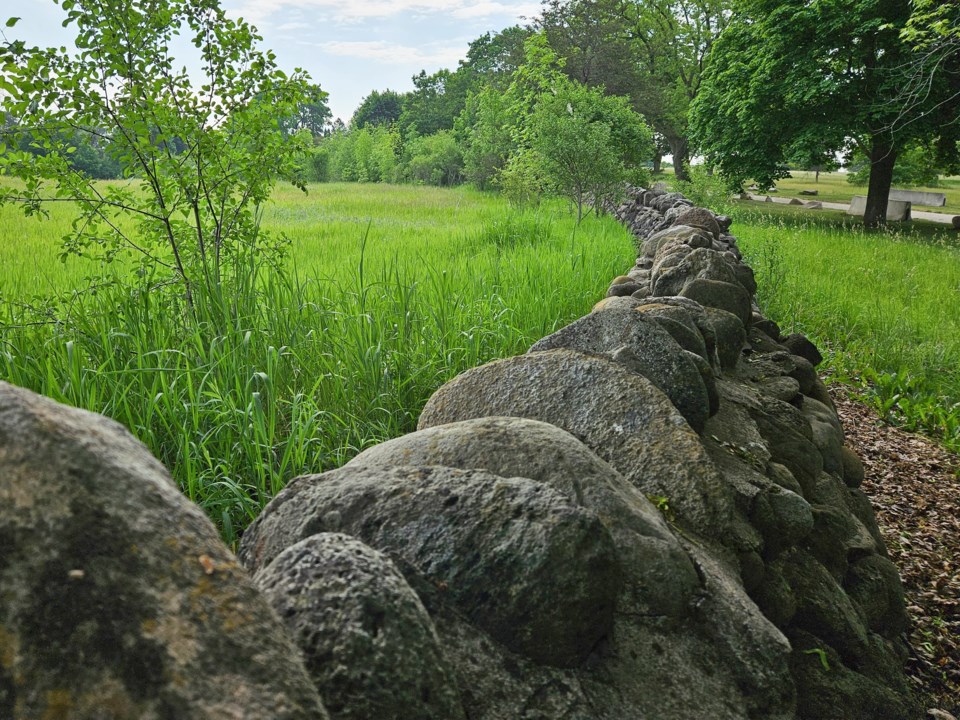A new local advocacy group, Urban Park Guelph, is urging the federal government to turn the former Ontario Reformatory lands into an urban park.
It would be a way to serve as a way to preserve nature, history, continue Indigenous reconciliation and be publicly accessible.
With threats to the area including; the proposed stormwater management pond, threats to the trestle bridge, collapse of the stone wall, threats to the Indigenous artwork inside the former Ontario Reformatory, P. Brian Skerrett, spokesperson for Urban Park Guelph, felt it was imminent to begin getting support for the project.
The call was initiated by Yorklands Green Hub, a Guelph non-profit organization aiming to create a hub for education at the former Ontario Reformatory lands. Since the project didn’t fall directly within its mandate it passed it onto the coalition now known as Urban Park Guelph, said Skerrett.
Yorklands Green Hub along with other people and organizations realized what a great opportunity it would be for the land to be an urban park because it has “been working towards preserving the property for the last 10 years,” said Lynn Bestari, Yorklands Green Hub board chair.
Parks Canada launched a program in 2021 called the National Urban Park Program to help support the creation of a network of 15 urban parks across Canada. By working with governments, Indigenous partners, and conservation organizations there will be opportunities to identify sites for the parks, said in a 2021 press release.
“So our goal is to make this so exciting and irrefutably wonderful, that if it's not one of the 15 parks, they have to actually make room for a 16th,” Skerrett said.
The site would need to enter a pre-feasibility stage where the Ministry of the Environment would look at the land and do a pre-feasibility study, he said.
If the site was chosen “we would be ecstatic. It would be awesome because Parks Canada would be providing the funding for the site on an ongoing basis under their national parks program. And that's very key, obviously, to keep it operating,” said Bestari.
“If we can get it established as a national urban park, our hope is to turn the superintendent's house into an eco demonstration site, education centre for living more sustainably and also having information and programs related to the park itself,” she said.
There is a laundry list of Guelph organizations endorsing the idea of an urban park in Guelph, including groups like Yorklands Green Hub, Nature Guelph and Guelph Hiking Trail Club.
Since the land is owned by the province either they would have to pony up the land and ask to be at the governance table or the federal government would have to buy the land, said Skerrett.
“We make no bones about the fact that we think we're a dark horse, we're a long shot in this process. But at the end of the day … the site is perfect. The history is perfect. The fact that we're adding cultural heritage isn't a requirement from Parks Canada, but it's a bonus on this site,” said Skerrett.
He has created a petition to direct Parks Canada to consider establishing an urban park on the land in Guelph. “I would love to see 10,000 signatures on that petition,” he said.
“The draw here is, it's 108 hectares of natural space. We will never be able to find that anywhere else in the city,” Skerrett said. He was asked by someone if there should be housing built there instead and his answer was “if we put housing here, we will never find this natural space within an urban centre.”
“I think we can actually do a better job of the Indigenous reconciliation story on this site than anywhere else,” said Skerrett.
“We don't have Indigenous land here. But what we do have is a history of mistreatment and Indigenous incarceration. And that is an incredibly powerful launchpad, launching points to conversations about residential schools that became the feeder system for the jail system,” he said.
There is a history of connecting people to nature at the site and is currently used by Yorklands Green Hub, The Guelph Outdoor School and more, said Skerrett.



